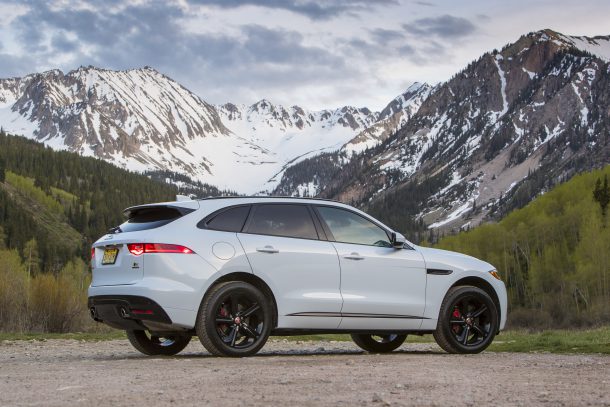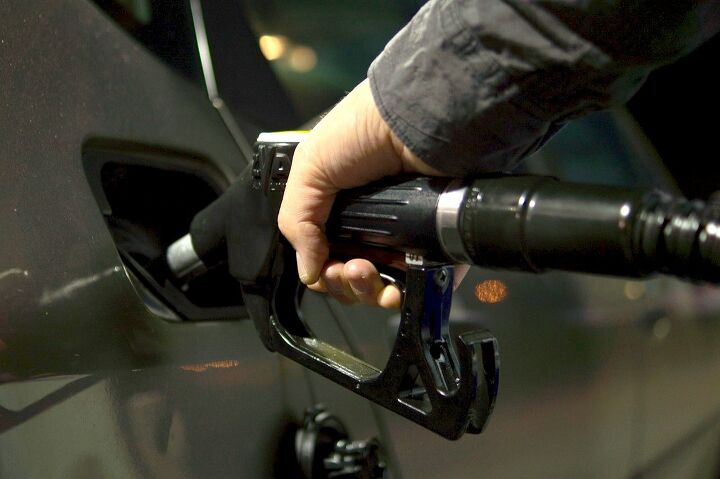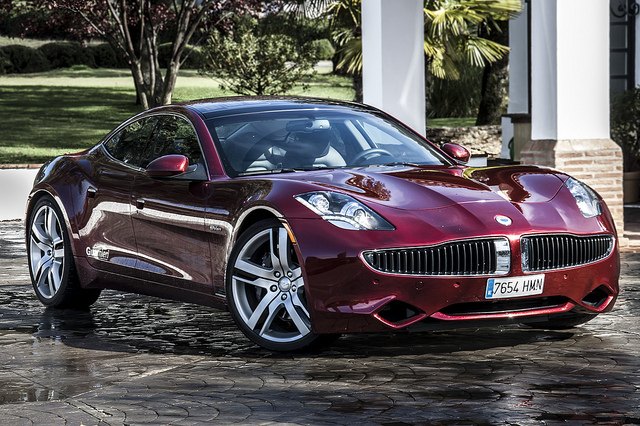#Government
Stop Being So Mean to Diesels, Pleads Jaguar Land Rover Boss
Ralf Speth isn’t having it. Across Europe governments are cracking down on the use of diesel vehicles in a bid to lower air pollution, especially in the Jaguar Land Rover CEO’s own country. London has announced plans to levy stiff charges on anyone driving a diesel-powered vehicle through central areas of the capital starting in early 2019, adding fuel to the anti-diesel fire. Paris, Berlin and Athens also plan to ban the technology.
With compression ignition still a significant part of the automaker’s engine lineup — both in Europe and North America — Speth recently defended the technology’s importance in a finger-pointing spiel. The world needs diesel, he claimed, and the media (and Volkswagen) haven’t done anything to help the situation.
Auto Industry Has Its Fingers Crossed for Trump's $1 Trillion Infrastructure Plan: Toyota Exec
As automakers dial back sales projections in a year that’s seen a rough start, the industry could be holding out hope for a legislative solution to lagging demand.
Toyota North America CEO Jim Lentz made this claim during the opening of the company’s expanded Ann Arbor research and design center on Thursday, adding that incentivizing new vehicles to draw down bulging inventories can’t continue forever. In his view, automakers are keeping extra vehicles on hand for a reason, not just because production hasn’t adjusted for slow sales.
Lentz, like other auto executives, is hoping for a sales bump in the event the Trump administration green-lights its proposed $1 trillion infrastructure plan.
GM Fires Its Venezuelan Workforce, Many by Text, as It Flees Country
Last week, General Motors’ long-idled Venezuela assembly plant fell into the hands of the country’s autocratic government, sparking the automaker’s exit from the strife-ridden nation.
With its material assets out of its hands, the automaker’s Venezuelan subsidiary jettisoned the plant’s entire 2,700-person workforce today, Reuters reports. It did so in as abrupt a manner as the takeover itself. Meanwhile, the government wants to chat.
Volkswagen's Diesel Whistleblower Identified in New Book
While it wasn’t quite on par with the drama of a mob trail, the criminal case of Volkswagen’s diesel emissions scandal possesses a lot of similarities. A break in the case, police raids, a powerful family, an unwillingness to cooperate with authorities, and an informant that made it all possible. But just who was the Henry Hill to Volkswagen’s Lucchese crime family?
According to a new book on the subject, written by New York Times reporter Jack Ewing, VW’s Engineering and Environmental Office head Stuart Johnson was the primary contact for the United States’ regulatory agencies. Johnson was on the front lines of the scandal and was among the first managers the EPA publicly reached out to in September of 2015, but it seems that may have been a ploy not to blow his cover — he had already spoken to the California Air Resources Board a month earlier.
GM Claims Venezuela Illegally Seized Its Factory, Ends Operations in the Country
If your news diet occasionally strays outside of the automotive realm, then you know that Venezuela is going through a “transitional phase.” The country’s economy is experiencing uncontrollable inflation, unemployment is around 25 percent, food is scarce, and public health services have become nonexistent. There is also more political turmoil than any single country could possibly handle. Venezuela’s capital of Caracas is now a hotbed of increasingly violent protests, as critics of President Nicolas Maduro are met with heavily armed security forces.
The opposition blames Maduro and the Supreme Court for turning the country in to a dictatorship after dissolving the National Assembly’s ability to govern. There are also claims that the leftist government is overstepping its bounds when it comes to property rights.
While you wouldn’t expect an automaker to weigh in on the matter, General Motors is accusing Venezuelan authorities of the illegal seizure of a plant in the industrial center of Valencia and has vowed to “take all legal actions” necessary to defend its rights. It’s also ceasing operations within the country.
Early EV Buyers Win, But the Segment Stands to Die Without Tax Credits: Report
So far, there’s no evidence the Trump administration plans to extend the federal tax credit incentive for the purchase of electric and plug-in vehicles.
Designed to kick-start the fledgling technology, the credits — totaling up to $7,500 per vehicle — will run out after automakers finish selling their first 200,000 eligible vehicles — a date that could occur as early as next year for some companies. This means a segment still as embryonic as the infrastructure meant to serve it could soon bite the dust.
A recent report from Edmunds predicts what will happen if the credits die, using a cancelled state credit as a crystal ball. Despite the hype around EVs, those incentives are an intravenous bag keeping the patient alive.
White House Plan Virtually Eliminates Funding for EPA Emissions Testing
The Trump administration’s current plan for the Environmental Protection Agency budget removes nearly all funding for vehicle emissions testing. Proposed cuts to the EPA’s budget would eliminate 99 percent of the agency’s $48 million in funding for vehicle testing, shouldering automakers with increased fees to split the difference.
However, former head of the EPA’s Office of Transportation and Air Quality Margo Oge is claiming that such a large cut would force the agency into “pretty much shutting down the testing lab” regardless of corporate contributions.
Trump Administration Now Seeking More Modest Changes to NAFTA
The Trump administration is changing its tune regarding the North American Free Trade Agreement.
Despite the president calling the pact the “worst deal” in history throughout his campaign and hinting his goal was to abandon the agreement, the White House intends to keep numerous provisions while seeking more moderate changes.
Among the more controversial arrangements Trump intends to keep are the arbitration panels that permit investors in the three nations to circumvent local courts to resolve civil claims. The administration even has a proposal that would improve these bodies’ procedures to resolve disputes.
Is this the bold trade overhaul that Trump promised on the campaign trail?
California Maintains Obama-era Emissions Rules in Affront to Trump's EPA
California has green-lit light-vehicle pollution targets that the Trump administration has placed under review. As expected, t he Golden State is going to continue playing hardball over Environmental Protection Agency regulations.
Already critical of the automotive industry for asking the president to reconsider federal guidelines through 2025, the California Air Resources Board hinted that it wouldn’t stray from the emission targets set by the Obama administration in 2012. On Friday, CARB finalized its state emissions rules while setting an updated ordinance on zero-emission vehicles. “We’re going to press on,” said Mary Nichols, head of the board, during last week’s press conference.
Suppliers Say Automakers Are Just Guessing the Timeline for Self-Driving Cars
President Donald Trump received a tour of the American Center for Mobility this week. He did not, however, discuss the federal funding of the Michigan-based autonomous testing and development facility. Instead, the site was used as a location for the president to discuss regulatory policies and meet with automotive executives. Little was said on the subject of self-driving cars.
Still, automakers routinely remind us that autonomous vehicles are right around the corner. Ford says it can have autonomous cars rolling out by 2021, Audi and Nissan have said 2020, and Volkswagen has claimed it’ll be ready for self-driving models in 2019. Tesla — which has been pioneering the technology longer than most — has stated it has the hardware necessary in its current production vehicles and would have a bulletproof system installed in 2018, anticipating regulatory approval in 2021. However, suppliers are predicting much less optimistic timelines for self-driving cars — and the dates given vary wildly.
Faraday Future's Chinese Sugar Daddy is Selling Land to Improve Its Crippling Financial Woes
Faraday Future is more of an automotive marketing company than it is an automaker. The company has been making unsubstantiated promises and ignoring its fiscal woes without giving much assurance that it will ever bring a production car — or assembly plant — into the real world. Problems have continued to mount and, like any deeply rooted zit, the situation is gradually coming to a head.
This month, Nevada State Treasurer Dan Schwartz demanded that the Governor’s Office of Economic Development conduct an audit of Faraday — throwing in Tesla for good measure. Schwartz has been critical of FF ever since it received government money to help build its factory, only to see work on the facility stalled due to nonpayment last fall. Faraday has since scaled back its construction plans, claiming that it was necessary to ensure production begins on schedule.
Now, FF’s primary backer, LeEco, is selling a 49-acre Silicon Valley property less than a year after purchasing it from Yahoo Inc. This comes after the company’s founder and CEO, Jia Yueting, explained to employees in November that LeEco was facing devastating financial issues stemming from its uncontrolled expansion.
Green Auto Loan and Grant Programs on Trump's Budget Chopping Block
Automakers would have to fund a larger share of future green technology projects if the Trump White House’s budget blueprint passes as written.
The administration proposes to do away with a little-used — and sometimes controversial — U.S. Energy Department loan program, as well as a grant program dedicated to spurring advanced fuel-saving technologies.
EPA Confirms 2025 Reg. Review as Trump Promises More American Automotive Might
Donald Trump said Wednesday his administration will reopen a review of the current auto emissions directives passed in the final throes of the Obama presidency. This is cause for celebration for automakers, who’ve practically begged the president to repeal the mandates on grounds that the goals are far too uncompromising and ill-suited for the present-day market.
Speaking at the American Center for Mobility, President Trump promised to bring more manufacturing back into the United States and continue to bring down regulatory barriers so that automakers can continue to thrive.
“We’re going to work on the CAFE standards so you can make cars in America again,” Trump said. “There is no more beautiful sight than an American-made car.”
Clearly, the president has either never seen an Aston Martin or is trying to make a point about the importance of domestic product.
Trump Likely to Announce Review of Vehicle Emission Regulations This Week
President Trump is prepared to make a formal announcement on the review of vehicle fuel efficiency standards that were locked in at the tail end of the Obama administration. Sources have confirmed that he’ll be meeting with automotive CEOs in Michigan this week to discuss the the situation after listening to them repeatedly beg him to repeal the current guidelines.
The president plans to visit an autonomous vehicle testing facility outside of Detroit on Wednesday before meeting with the automotive heads representing the Detroit Three. White House spokesman Sean Spicer said on Monday that the trip is centered around “job creation and automobile manufacturing … highlighting the need to eliminate burdensome regulations that needlessly hinder meaningful job growth.”
Japan Says There's Nothing Closed About Its Barrier-filled Automotive Market
Japan has, once again, scoffed at U.S. demands for better access to its car market on Friday, setting the tone for next month’s unproductive talks on bilateral trade and economic relations between the two countries. U.S. Vice President Mike Pence and Japanese Deputy Prime Minister Taro Aso are supposed to hash things out in April but, before they’ve even managed to exchange pleasantries, the table is being set for failure.
If you’re wondering who is to blame, there are plenty of places to point the finger. The U.S. government complained to the World Trade Organization on Wednesday, claiming there are “a variety of non-tariff barriers [that] impede access to Japan’s automotive market.”
Today, Japan’s Chief Cabinet Secretary, Yoshihide Suga, offered his rebuttal to reporters. “We do not impose import tariffs on cars, and we do not impose any non-tariff barriers,” he said.



























Recent Comments